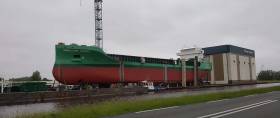Displaying items by tag: 10 new 'C' class cargoships
First of New Design ‘Arklow’ Cargsoships from Ferus Smit
#NewCseries - The first in a new class of 10 cargoships for Arklow Shipping under construction near Groningen, Netherlands is to be launched next month and follows a series of a different design built by the same yard, writes Jehan Ashmore.
Launching of leadship newbuild no. 424 Arklow Cadet (also a new name for ASL), a ‘C’ class cargoship with a capacity of over 5,000dwt is to take place at Ferus Smit’s Dutch yard at Westerbroek.
The facility in north-east of the country is where newbuild no. 435 M.V. Ireland was christened (for non-Irish owners) in March as seen in footage previously featured on Afloat.ie. Note on the left of the screen is a green coloured hull mid-section of Arklow Cadet between the builder’s hall and that of M.V. Ireland before launching.
The newbuild represents the first under construction at the Dutch yard for ASL since Arklow Breeze became the final of six ‘B’ class 8,860dwt series. This newbuild no. 414 was launched in March 2015 and entered service the following month. Of the current fleet of 45 cargoships ranging from 4,200-35,000dwt, only 10 vessels date to 2004 or earlier.
Likewise of the Arklow Cadet the ‘B’ class have hulls form chosen to adapt the ‘bulbless’ principle thus creating a slender bow without bulb.
Arklow Cadet has one single hold volume of 220.000 cft. The C class have a 1A iceclass notation and they are propelled by a 1740 kW MaK engine with a single ducted propeller. Delivery of Arklow Cadet is scheduled for July of this year.
Another Dutch yard, Royal Bodewes in Hoogezand which is only several kms away from Ferus Smit continues to roll-out the ‘V’ class series of 10 Eco-Trader 5,100dwt newbuilds. The latest fourth newbuild's stern section was recently removed out of the builder's hall to the outfitting quay.
The V class are managed by Arklow Shipping Nederland B.V. based in Rotterdam and among the bulk dry cargoes they transport they include grain, animal feed and steel rails.
The last completed sister newbuild no. 723, Arklow Valiant launched at the end of March. This week the newbuild was towed down the canal to reach Delfzijl from where sisters have undergone sea-trails.






























































